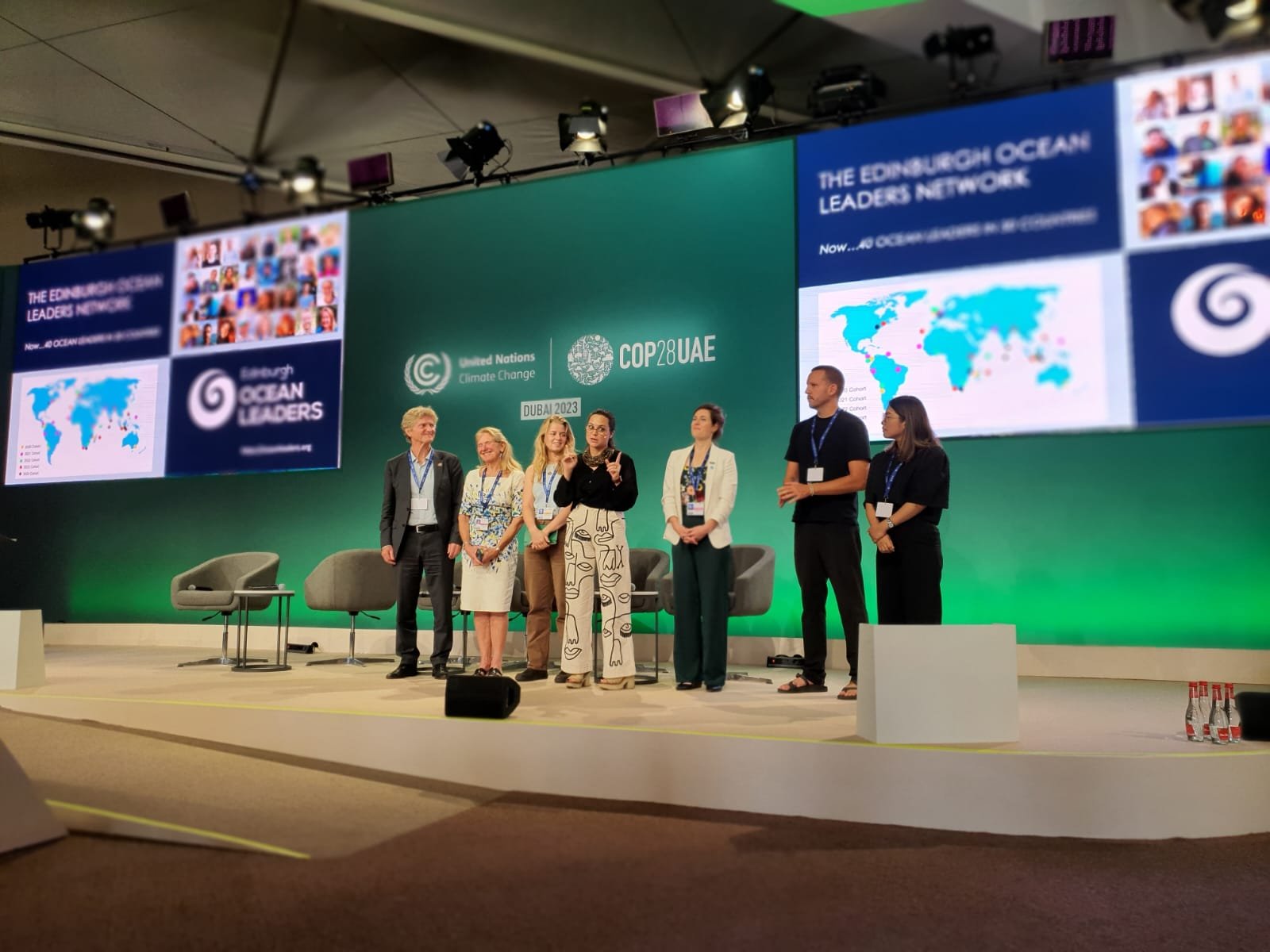6 Reflections on COP28: A New Hope or a Sinking Star Ship?
By: Adam Miller and Novia Sagita
This year, the CEO of Yayasan Planet Indonesia, Novia Sagita, and I had the pleasure of joining the Nature Positive Delegation at the United Nations Framework Convention on Climate Change (UNFCCC) 28th Convention of Parties (COP). If you have been on social media lately, you have probably seen the endless climate advocates, governments, corporations and fossil fuel lobbyists sharing their messages for the future under the #CoP28 hashtag.
For those that don’t know, the COP meetings are annual gatherings where countries come together to discuss and negotiate actions to address climate change on a global scale. These meetings are crucial in shaping international climate policy, setting emission reduction targets, discussing adaptation measures, and negotiating agreements to combat climate change.
This was the first COP we had the opportunity to attend on behalf of Planet Indonesia. With the bustling nature of some 80,000 delegates running around the 1,082 acre (438 hectare) Dubai World Expo, we left the convention feeling both concerned for our planet’s future and motivated that the work of Planet Indonesia is more important now than ever.
Adam Miller and Novia Sagita representing Planet Indonesia at CoP28
Our six major reflections of COP 28:
1. Community tenure rights risk being positioned as a ‘box to check.’
From day one, Novia and I kept hearing this call to action: ‘We [practioners, funders, governments] need to get more lands with legally recognized tenure for local communities so they can access climate finance.’
This statement is inherently colonial and transactional in nature as it does not recognize that Indigenous peoples and local communities (IPLCs) should and must have their own autonomy and right to manage and safeguard their territories, lands, forests, and oceans. Rather, it positions legal tenure as a means to begin a carbon finance project. Positioning it as a box to check in the ‘climate finance readiness’ package positions tenure as a commodity without recognizing the non-monetary social, biocultural role that legal recognition provides. Tenurial rights must be seen as a fundamental human right, independently of the vested interests of the carbon market. IPLCs around the globe - including in Indonesia - die fighting for their rights over territories and protecting them, and yet resource rights are now being dominated by carbon business agendas and project development processes. While the call for advancing tenure rights is encouraging, focusing on the provision of climate finance misses the central value and points to an extractive approach. IPLCs are positioned as a means to an end, expanding the international carbon market and creating the benefits largely for Western companies and actors. At Planet Indonesia, we call for the climate community to recognize the diverse set of priorities and solutions that IPLCs have and that legally secured tenure over ecosystems (from ridge to reef) is a basic human right. Community autonomy and rights to engage, or not, with carbon finance must be respected.
2. It is unclear on who is willing to pay for legal tenure.
For areas where communities are interested in pursuing climate finance as a revenue stream but lack legal tenure, another strange and unethical challenge exists. Carbon and payment for ecosystem service schemes require clear boundaries and legally defined tenure as a prerequisite to access funds (e.g., hence #1 above). However, most project developers are unwilling to pay for this as it can be a long, cumbersome process that differs from country to country. Supporting communities with carbon finance is seen as ‘too risky’ and ‘prone to leakage’ when clear tenure isn’t secured.
The result? Tenure is mainly dependent on traditional philanthropy, while carbon project developers wait for legal recognition of project areas to be recognized to reduce ‘their risk.’ At Planet Indonesia, we call for widespread global support of community tenure, and we stress that this support is not a box to check but is a basic human right. With secured tenure, communities should have their own autonomy and right to sell or not sell carbon from their legally secured and recognized areas.
3. Big financial commitments, little clarity on action.
I was joking with Novia on day 2 that I have never felt like 10 million U.S. dollars is so little in my entire life. Every session seemed to start with a 500 million, 2 billion, or even greater commitment to reverse climate change. However, after 8 days of 8+ sessions a day, we only found two sessions that actually laid out the mechanisms on how funds would reach frontline communities and local civil society organizations. The well-known figure of “less than 2% of climate finance reaches frontline communities” was thrown around a lot… but the answer seemed to be to get more money into the space and not spend it more wisely. At Planet Indonesia, we call for transparency and specific mechanisms that get financial resources into the hands of those who are best positioned to use it - frontline local organizations and communities. We’d rather see 10 million spent well than 500 million siphoned off by bureaucratic processes of the ‘usual suspects’ in the climate space.
4. “Now Banks can make money off conservation.”
This is a direct quote from one of the world’s largest conservation non-profits (which we will not name at this time) about climate finance and debt for nature swaps. Novia and I raised our hands and stated, “In Indonesia, >70% of extractive industries (e.g. mining, logging, oil palm, industrial fishing) are financed by big global banks. So financial institutions are now making money off destroying and restoring nature?”
Our question received gasps around the room that we had the audacity to ask such a distinguished figure such a volatile question. For us, at Planet Indonesia, this destructive cycle by global banks is at the heart of the whole problem. The corporization of sustainability and climate change isn’t going to solve the global crisis we face. While we do agree that we need to bring in the private sector in its diverse nature to solve this crisis. The estimated 700 billion U.S. dollars needed to begin the reversal of this crisis will require everyone.
However, how power is distributed and the commodification of greenhouse gases as an asset class needs to be examined through not only a financial lens but also an ethical one. ‘The Great Cash for Carbon Hustle’ published in the New Yorker earlier this year, paints an adequate picture of this.
5. Nature (and nature-based solutions) are being centralized in the climate debate.
A new joint statement (read it here) undersigned by the COP presidency, with the support of other conventions (e.g. Convention for Biological Diversity), put nature and people at the center of the climate debate. While this is the right step, recognizing that nature is about 30% of the climate change solution, it does make us wonder what was discussed at COP1-27. Recognizing the role that forests, oceans, and diverse ecosystems play in regulating our climate, sequestering greenhouse gases, and providing critical ecosystem services should be something we inherently understand within the global climate community. We were proud to be a part of the Nature Positive Delegation (read more here), which put nature and the role of Indigenous Peoples and Local Communities (IPLCs) at the forefront.
6. “Including us [Indigenous Peoples] doesn’t mean inviting us to join, it means letting us define the agenda and run the meeting.”
This was the main point from a powerhouse panel of Indigenous leaders from Brazil, Indonesia, and the DRC on day one. Planet Indonesia couldn’t agree more! While COP28 has been celebrated for having high levels of diversity in attendance, particularly by IPLCs, the demands and requests were clear - respect our rights and our self-determination…allow us to define the climate response on our terms, not yours.
Novia and I left the Convention feeling mixed emotions of depression and motivation. While there were some stand-out sessions from fellow organizations like our friends in the Nature Positive Delegation (over 15 orgs), Health in Harmony, Blue Ventures, and the Pawanka fund, the majority of sessions were a whole lot of ‘talk’ with little clarity on the ‘do.’
It is clear the work of Planet Indonesia is needed more than ever.
To solve this planetary crisis, we will continue to:
Elevate and invest in community solutions in all their forms.
Strengthen local governance institutions that enable communities to define the terms of engagement and use financial resources on their terms, not on the terms of the polluters.
Amplify mechanisms that harness resources and redistribute them to frontline place-based organizations and communities.
See Novia’s live interview with “We Don’t Have Time.”
CEO and Co-founder of Yayasan Planet Indonesia Novia Sagita talks to We Don’t Have Time about what we have learned from being on the front lines of climate change and adaptation in Indonesia. Her key message: “Put communities back at the center and invest in grassroots solutions.”
Planet Indonesia attendees were sponsored by Nature 4 Climate (nature4climate.org ; a coalition of 10+ organizations) to attend the CoP28 negotiations as part of the Nature Positive Delegation.




